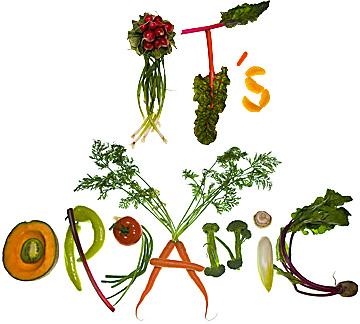Organic food trend sprouts up locally

Photo Illustration by Aaron Facemire and Erica Magda
Jan 25, 2008
Last updated on May 12, 2016 at 08:29 p.m.
Organic and locally grown food can be beneficial both to people’s health as well as to the environment, making it increasingly popular. Organically grown food has been grown or raised under prescribed circumstances by law, said Rebecca Roach, a teaching associate in the department of food science and human nutrition.Organic and locally grown food can be beneficial both to people’s health as well as to the environment, making it increasingly popular.
Organically grown food has been grown or raised under prescribed circumstances by law, said Rebecca Roach, a teaching associate in the department of food science and human nutrition.
“The gentleness with which the organic crops are raised really helps the planet; there are many environmental benefits,” Roach said.
Roach added that food raised organically will have fewer pesticide residues making it both better-tasting and healthier for consumers.
Get The Daily Illini in your inbox!
Food that is locally grown also provides many benefits to consumers and the environment alike.
“Locally grown food really supports the community and may be more nutritious,” Roach said.
Jon Cherniss owns Blue Moon Farm in Urbana, which is a United States Department of Agriculture certified organic food producer. This means they have to follow certain national health standards. Blue Moon Farm produces 40 to 50 different types of crops, mostly for fresh market sale.
While some Champaign and Urbana residents may be wondering if the switch to organic or locally grown food is the best choice for their lifestyle, Blue Moon products can be found at the Common Ground Foods Cooperative, Strawberry Fields and the Urbana Farmers Market, along with many other health food products.
“It’s all about quality and flavor,” Cherniss said. “We grow varieties that taste better, and when you are buying locally you are getting a fresher product.”
The University hosted the Midwest Organic Production and Marketing Conference and Trade Show Jan. 17 and 18 at the Illini Union. Farmers and producers of organic food attended sessions and meetings about their trade and how to keep up with the quickly diversifying and growing industry.
“Every year for almost 20 years there has been an increase of about 20 percent in organic consumption,” said Mark Kastel, a key note speaker at the conference and the director of the Organic Integrity Project and co-founder of the Cornucopia Institute, which is dedicated to progressive farm policy research.
“Consumers are increasingly concerned about the safety and nutritional value of their food, so organic food is a good alternative,” Kastel added.
One concern with organic or locally grown food is its high price compared to buying regular food at the grocery store. Kastel said this increase is often overcome by consumers because they are choosing to make a more positive choice for their family and society.
“One of the reasons that the price is higher is that they cost more to produce,” Kastel said, explaining that a fair wage for the farmers who produce these products is built in.
Researchers in the area do, however, warn that organic food will not cure illnesses or make consumers perfectly healthy.
“Just because it says organic on it doesn’t mean that it’s better for you,” Roach said.
“But it can be part of a healthy diet and an environmentally friendly relationship with food.”
Interested in organic and locally grown food?
Try…
Strawberry Fields, 306 W. Springfield Ave., Urbana
Natural Gourmet, 2225 S. Neil St., Champaign
Common Grounds Food Co-op, 403 S. Wright St., Champaign
Urbana Farmers Market, SE Lot of Lincoln Square, Urbana





